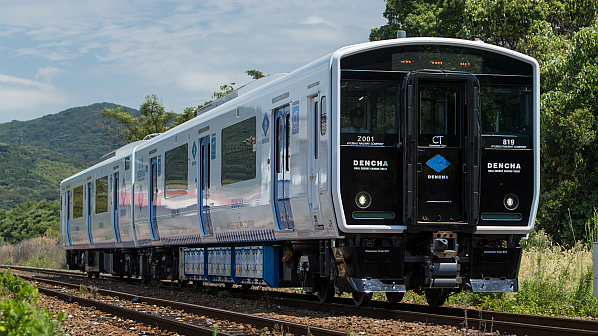HITACHI says its Dual Energy Charge Train (Dencha), the world’s first battery-powered train charged by ac overhead lines, has reduced CO₂ emissions by 2700 tonnes in the past five years.
The 18 two-car, 39m-long, 120km/h BEC819 series trains began operating on the 11km Wakamatsu - Orio line in October 2016 for Kyushu Railway Company (JR Kyushu) and have since completed 5 million kilometres in passenger service in the northern Kyushu region. Nearly 80% of the distance covered is on non-electrified sections of the route.
The trains draw power from the 20kV ac 60Hz electrification system to feed a bank of on-board batteries, which give the train a wire-free range of up to 90km. There is also a low-energy loss main circuit system fitted to the BEC819 fleet which reuses regenerative energy from braking and fast charging while stopped at stations.
The Dencha trains replaced an ageing fleet of diesel trains. Electrification was not considered feasible for the low-traffic line, instead battery technology offered reduced fuel costs.
Since the introduction of the Dencha, Hitachi has since built Masaccio regional battery trains in Italy, battery trams in Florence and plans to test an inter-city battery hybrid train in Britain. Hitachi is also part of a partnership with JR East and Toyota to develop hybrid (fuel cell) test vehicles, known as Hybari, which are scheduled to start running in Japan next year.

